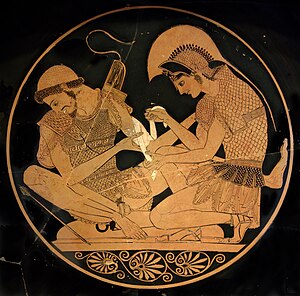Ἰλιάς
ἡγούμενος τῶν ἡδονῶν ἀλλ' οὐκ ἀγόμενος ὑπ' αὐτῶν → of his pleasures he was the master and not their servant
English (LSJ)
[ῑ], άδος, ἡ, pecul. fem. of
A Ἰλιακός, χώρη Hdt.5.94, cf. A.Ag. 453(lyr.), E.Hec.102(anap.), 923(lyr.), etc.; epithet of Athena, Hdt. 7.43, IG9(1).350 (ii B.C.).
II as substantive,
1 (sc. γῆ) Troy, the Troad, Hdt.5.122.
2 (sc. γυνή) a Trojan woman, E.Hel.1114 (lyr.), Tr.245 (lyr.), etc.
3 (sc. ποίησις) the Iliad of Homer, Hdt.2.116, Arist.Po.1448b38, al.: prov., κακῶν Ἰλιάς, i.e. an endless string of woes, D.19.148, D.S.36.6, etc.
III a kind of thrush, perhaps the redwing, Turdus iliacus, Arist.HA617a21 (s.v.l.); cf. ἰλλάς III.
French (Bailly abrégé)
άδος
adj. f.
d'Ilion ; ἡ Ἰλιάς (χώρα) le territoire d'Ilion ; (s.e. ποίησις) l'Iliade, poème d'Homère.
Étymologie: Ἴλιον.
Greek Monolingual
και Ιλιάδα, η (Α Ἰλιάς, -άδος) Ίλιος
ο τίτλος του μεγάλου έπους του Ομήρου
αρχ.
1. ως κύριο όν. ἡ Ἰλιάς
επίθ. της Αθηνάς
2. φρ. α) «Ἰλιὰς γῆ» — η γη της Τροίας
β) «Ἰλιὰς γυνή» — η γυναίκα που κατάγεται από την Τροία
3. παροιμ. «κακῶν Ἰλιάς» — ατελεύτητη σειρά δυστυχημάτων
4. είδος πτηνού.
Greek Monotonic
Ἰλιάς: [ῑ], -άδος, ἡ,
I. ανώμ. θηλ. του Ἰλιακός, σε Ηρόδ., Τραγ.
II. ως ουσ.:
1. (ενν. γῆ), Τροία, Τρωάδα, Τρωική γη, σε Ηρόδ.
2. (ενν. γυνή), Τρωαδίτισσα, σε Ευρ.
3. (ενν. ποίησις), η Ιλιάδα, σε Αριστ.· παροιμ., Ἰλιὰς κακῶν, δηλ. ατελείωτη σειρά από δεινά, δυστυχίες, θρήνους, σε Δημ.
Russian (Dvoretsky)
Ἰλιάς: άδος ἡ
1 (sc. γυνή) илионская женщина, троянка Eur.;
2 (sc. χώρα) область Илиона Her.;
3 (sc. ποίησις) Илиада (Гомера) Arst.: Μικρὰ Ἰ. Arst. Малая Илиада (недошедшая до нас поэма о событиях, последовавших за смертью Ахилла); Ἰ. κακῶν Dem. погов. повесть о бесконечных бедствиях, т. е. нескончаемая вереница несчастий.
4 Ἰλιάς: άδος (ῑλ) [f к Ἰλιακός илионская, троянская (χὧρη Her.; γᾶ Aesch., Eur.).
Middle Liddell
Ἰ¯λιάς, άδος,
I. fem. of Ἰλιακός, Hdt., Trag.
II. as substantive: Troy, the Troad, Hdt.
2. (sub. γυνή), a Trojan woman, Eur.
3. (sub. ποίησισ), the Iliad, Arist.; proverb., Ἰλιὰς κακῶν, i. e. an endless string of woes, Dem.
Wikipedia EN
The Iliad (/ˈɪliəd/; Ancient Greek: Ἰλιάς Iliás, pronounced in Classical Attic; sometimes referred to as the Song of Ilion or Song of Ilium) is an ancient Greek epic poem in dactylic hexameter, traditionally attributed to Homer. Set during the Trojan War, the ten-year siege of the city of Troy (Ilium) by a coalition of Greek states, it tells of the battles and events during the weeks of a quarrel between King Agamemnon and the warrior Achilles.
Although the story covers only a few weeks in the final year of the war, the Iliad mentions or alludes to many of the Greek legends about the siege; the earlier events, such as the gathering of warriors for the siege, the cause of the war, and related concerns tend to appear near the beginning. Then the epic narrative takes up events prophesied for the future, such as Achilles' imminent death and the fall of Troy, although the narrative ends before these events take place. However, as these events are prefigured and alluded to more and more vividly, when it reaches an end the poem has told a more or less complete tale of the Trojan War.
The Iliad is paired with something of a sequel, the Odyssey, also attributed to Homer. Along with the Odyssey, the Iliad is among the oldest extant works of Western literature, and its written version is usually dated to around the 8th century BC. In the modern vulgate (the standard accepted version), the Iliad contains 15,693 lines; it is written in Homeric Greek, a literary amalgam of Ionic Greek and other dialects. According to Michael N. Nagler, the Iliad is a more complicated epic poem than the Odyssey.
Wikipedia EL
Η Ιλιάδα (Ἰλιάς) είναι ένα από τα ομηρικά έπη, μαζί με την Οδύσσεια και σώζεται ολόκληρη στις μέρες μας. Η σύνθεσή της, που κατά την παράδοση έγινε από τον Όμηρο, τοποθετείται στον 8ο αιώνα π.Χ. και βασίζεται στην παράδοση προφορικής σύνθεσης και απαγγελίας ηρωικών ποιημάτων που είχε αναπτυχθεί τους προηγούμενους αιώνες. Το ποίημα, που περιγράφει κάποια γεγονότα του δέκατου και τελευταίου χρόνου της πολιορκίας της Τροίας (Ιλίου) από τους Έλληνες (Αχαιοί ή Αργείοι ή Δαναοί στο έπος), είναι γραμμένο σε δακτυλικό (ή ηρωικό) εξάμετρο σε έντεχνη ποιητική γλώσσα και αποτελείται από 15.693 στίχους.
Translations
af: Ilias; als: Ilias; am: ኢሊያዳ; an: Iliada; ar: الإلياذة; arz: الالياذه; ast: Ilíada; azb: ایلیاد; az: İliada; bar: Ilias; bat_smg: Iliada; ba: Илиада; be_x_old: Іліяда; be: Іліяда; bg: Илиада; bn: ইলিয়াড; bo: ཨེ་ལི་ཡེ་ཏེ།; br: Ilias; bs: Ilijada; bxr: Илиада; ca: Ilíada; ce: Илиада; ckb: ئیلیادە; cs: Ilias; cv: Илиада; cy: Iliad; da: Iliaden; de: Ilias; diq: İliyad; el: Ιλιάδα; en: Iliad; eo: Iliado; es: Ilíada; et: Ilias; eu: Iliada; fa: ایلیاد; fiu_vro: Ilias; fi: Ilias; fr: Iliade; fur: Iliade; fy: Ilias; ga: Iliad; gl: Ilíada; got: 𐌹𐌻𐌹𐌰𐍃; he: איליאדה; hif: Iliad; hi: इलियाड; hr: Ilijada; hu: Iliasz; hy: Իլիական; hyw: Իլիական; ia: Iliade; id: Iliad; ilo: Iliada; io: Iliado; is: Ilíonskviða; it: Iliade; jam: Iliad; ja: イーリアス; ka: ილიადა; kk: Илиада; kn: ಇಲಿಯಡ್; ko: 일리아스; ku: Îlyada; ky: Илиада; la: Ilias; lb: Ilias; lfn: Iliada; li: Ilias; lmo: Iliad; lt: Iliada; lv: Iliāda; map_bms: Iliad; mk: Илијада; ml: ഇലിയഡ്; mn: Илиадаmr: इलियड; ms: Iliad; mt: Ilijade; new: इलियाद; nl: Ilias; nn: Iliaden; no: Iliaden; oc: Iliada; pa: ਇਲੀਆਡ; pcd: Iliade; pl: Iliada; pms: Ilìad; pnb: الیاد; pt: Ilíada; qu: Iliada; ro: Iliada; ru: Илиада; scn: Iliadi; sco: Iliad; sh: Ilijada; simple: Iliad; si: ඉලියඩ්; sk: Iliada; sl: Iliada; sq: Kënga e Ilionit; sr: Илијада; sv: Iliaden; sw: Ilias; ta: இலியட்; te: ఇలియడ్; tg: Илиада; th: อีเลียด; tl: Iliada; tr: İlyada; tt: Илиада; uk: Іліада; ur: ایلیڈ; uz: Iliada; vi: Iliad; war: Iliada; wuu: 伊利亚特; xmf: ილიადა; yi: איליאדע; zh_min_nan: Ilias; zh_yue: 伊利亞德; zh: 伊利亚特

